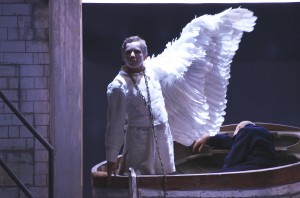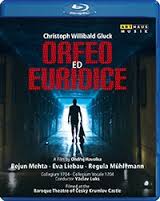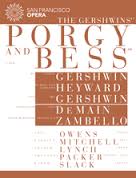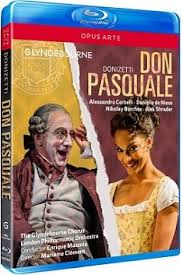
Welsh National Opera have won the prestigious Royal Philharmonic Society [RPS] Opera and Music Theatre Award for their productions of Lulu, Lohengrin and Paul Bunyan in 2013. The criteria for RPS Opera and Music Theatre Award is for musical and artistic excellence of a production, company (large or small-scale) or individual.
The RPS Music Awards, presented in association with BBC Radio 3, are the highest recognition for live classical music and musical excellence in the United Kingdom. Winners in 13 categories, chosen by independent juries, were announced at a glittering ceremony at London’s Dorchester Hotel (evening – 13 May) hosted by BBC Radio 3’s Petroc Trelawny and Sara Mohr-Pietsch, with silver lyre RPS trophies presented by pianist Graham Johnson.
David Pountney, WNO Chief Executive & Artistic Director says, “WNO is incredibly proud to receive this, the most prestigious of all the music awards. It is especially gratifying for us because it acknowledges the breadth and reach of our work, from the ambitious and relatively rarefied in the case of Lulu, the classical in the case of Lohengrin, and finally encompassing our highly skilled and innovative Youth and Community programme with Paul Bunyan. This award is a true badge of quality, and we hope it will inspire all those who support WNO and culture generally to redouble their efforts to ensure that we remain a civilised, cultivated community with access to the great traditions of European culture.”
Berg’s Lulu opened WNO’s Spring season in 2013 and marked David Pountney’s first new production in his role as Chief Executive & Artistic Director of WNO. The production, which was conducted by WNO Music Director Lothar Koenigs, received rave reviews from press and was nominated for the 2014 Opera Awards in the category of ‘New Production’. The role of Lulu was sung by Marie Arnet.
Antony McDonald’s new production of Lohengrin, which was staged by WNO in Summer 2013, marked the bicentenary of Wagner’s birth and the opening performance was performed in the presence of His Royal Highness The Prince of Wales, Patron of Welsh National Opera at Wales Millennium Centre, Cardiff. The production was conducted by Lothar Koenigs, with Peter Wedd singing the role of Lohengrin and soprano Emma Bell singing Elsa von Brabant. Fiona Maddocks from The Observer described the production as a ‘tour de force’ and it earned a 5* review from the Financial Times.
Lothar Koenigs says: “I feel very privileged to be Music Director of WNO and I want to thank all my colleagues for their commitment and passion for opera. Everyone at WNO should be proud that all their hard work has been recognized by this most prestigious award.”
Paul Bunyan was a production by WNO Youth Opera, which was performed in August 2013 and featured more than 100 singers, orchestral players, technical students, costume makers, dressers and wigs & make up students all aged between 16 & 25. Amongst the cast were Only Boys Aloud as The Lumberjack Chorus and Stephen Fry as the voice of Paul Bunyan. The production also marked the centenary of Britten’s birth last year in 2013 and was shortlisted in the Opera category of the South Bank Sky Arts Awards.
On presenting the award the RPS Jury said: “Lulu, Lohengrin and Paul Bunyan were three bold, contrasting productions, each of the very highest musical and theatrical standard. A showcase for Welsh National Opera’s world-class ensemble, orchestra and chorus. And forPaul Bunyan they were joined by Welsh National Youth Opera, whose collaboration with boys’ choir, Only Boys Aloud, gave a fresh and powerful insight into Britten’s first opera.”
A special programme devoted to the RPS Music Awards will be broadcast on BBC Radio 3 on Sunday 18 May at 10pm.
The RPS Music Awards are unique in the breadth of musical achievement they span – from performers, composers and inspirational arts organisations to learning, participation and engagement. The list of winners since 1989 reads as a roll call of the finest living musicians. www.rpsmusicawards.com






